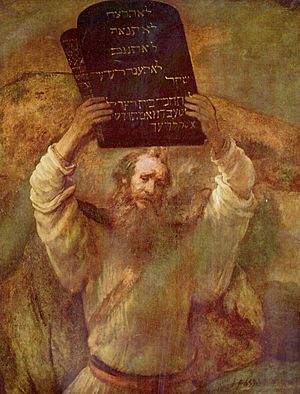Old Testament facts for kids

The Old Testament is the first main part of the Bible for Christians. It was written a long time ago, before Jesus Christ was born. Jewish people call this collection of books the Tanakh. Scholars often use the name "Hebrew Bible" because it was mostly written in Hebrew.
Both Jews and Christians believe these books are holy. They believe that God inspired people to write down these stories and teachings.
The Old Testament is made up of many different "books." These books tell stories about God and the people of Israel. They share important lessons and history.
You can think of the Old Testament as having several main parts:
- The Torah (also called the Law)
- The History of Israel
- The Prophets
- The Wisdom books
The name "Old Testament" was probably first used by a writer named Tertullian in the 2nd century. He used the Latin words vetus testamentum.
Different religious groups have slightly different lists of books in their Old Testaments. For example, the Eastern Orthodox Church uses an older Greek translation called the Septuagint. This version has a few more books than the one used by the Roman Catholic Church. Protestant Bibles usually follow the books found in the Tanakh, but they arrange them in a different order.
What the Old Testament Teaches
In the Old Testament, God is always shown as the one who created the whole world. Even though other gods might have been believed in by some people back then, the Old Testament always teaches that the God of Israel is the only one they should worship. This God, often called Yahweh, is seen as the only "true God" and is all-powerful. Both Jewish and Christian people believe that the Bible (both Old and New Testaments) teaches that there is only one Almighty God.
The Old Testament highlights a special relationship between God and his chosen people, Israel. This relationship is like a special agreement or "biblical covenant" that God made with Moses. The laws and rules found in books like Exodus and Deuteronomy explain the terms of this agreement. Israel promised to be loyal to God, and God promised to protect and support Israel.
Other important ideas in the Old Testament include:
- Salvation: Being saved or rescued.
- Redemption: Being set free or bought back.
- Divine judgment: God's fair decisions.
- Obedience and disobedience: Following or not following God's rules.
- Faith and faithfulness: Trusting God and staying loyal.
There is a strong focus on doing what is right (ethics) and being clean or pure in religious ways (ritual purity). God asks for both. However, some prophets and wisdom writers in the Old Testament suggest that God cares more about social justice and treating others fairly than about strict religious rituals.
The Old Testament teaches that it is important to be fair and to help people who are weak or in need. Leaders should judge people without being biased. It also says that people should not be corrupt or deceive others when trading. All good actions and morals are believed to come from God, who is the source of all goodness.
The idea of why bad things happen to good people (the problem of evil) is also a big part of the Old Testament. The writers wondered why a good God would allow disasters to happen to his people, especially the Babylonian exile. This theme is explored in many books, like the histories of Kings, the prophets Ezekiel and Jeremiah, and wisdom books like Job and Ecclesiastes.
| Old Testament (Tanakh) |
|---|
|
Old Testament Books of the Old Agreement common to all Christians and Jews)
Additional Books (common to Catholics and Orthodox)
Georgian Orthodox |
Books of the Old Testament
Here is a list of the books found in most Christian Old Testaments:
- Genesis (50 Chapters)
- Exodus (40 Chapters)
- Leviticus (27 Chapters)
- Numbers (36 Chapters)
- Deuteronomy (34 Chapters)
- Joshua (24 Chapters)
- Judges (21 Chapters)
- Ruth (4 Chapters)
- 1 Samuel (31 Chapters)
- 2 Samuel (24 Chapters)
- 1 Kings (22 Chapters)
- 2 Kings (25 Chapters)
- 1 Chronicles (29 Chapters)
- 2 Chronicles (36 Chapters)
- Ezra (10 Chapters)
- Nehemiah (13 Chapters)
- Esther (10 Chapters)
- Job (42 Chapters)
- Psalms (150 Chapters)
- Proverbs (31 Chapters)
- Ecclesiastes (12 Chapters)
- The Song of Solomon (8 Chapters)
- Isaiah (66 Chapters)
- Jeremiah (52 Chapters)
- Lamentations (5 Chapters)
- Ezekiel (48 Chapters)
- Daniel (12 Chapters)
- Hosea (14 Chapters)
- Joel (3 Chapters)
- Amos (9 Chapters)
- Obadiah (1 Chapter)
- Jonah (4 Chapters)
- Micah (7 Chapters)
- Nahum (3 Chapters)
- Habakkuk (3 Chapters)
- Zephaniah (3 Chapters)
- Haggai (2 Chapters)
- Zechariah (14 Chapters)
- Malachi (4 Chapters)
The first five books of the Bible (Genesis, Exodus, Leviticus, Numbers, and Deuteronomy) are often called the Pentateuch. In the Jewish Bible, these five books are known as "the Torah."
See also
 In Spanish: Antiguo Testamento para niños
In Spanish: Antiguo Testamento para niños
 | Leon Lynch |
 | Milton P. Webster |
 | Ferdinand Smith |

